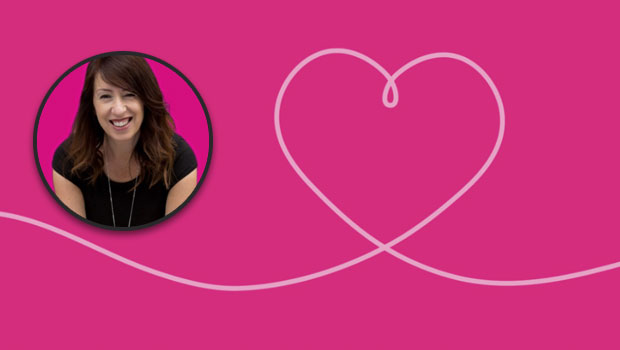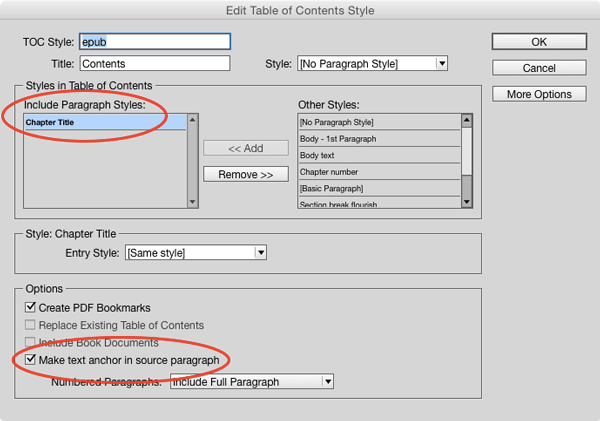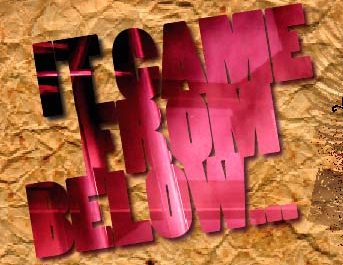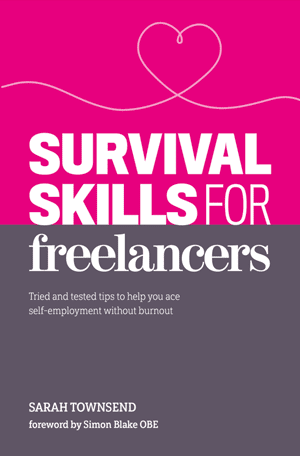Book Review: Survival Skills for Freelancers
Tried and tested tips to help you ace self-employment without burnout.

In the opening pages of Survival Skills for Freelancers (self-published 2020, 212 pages), Sarah Townsend tells a relatable story of how she became a freelancer. It wasn’t by choice. The employer she loved would not agree to reduce her hours post maternity leave so she could care for her baby. Her company suggested she work freelance and offered some work to get her started.
Years later Ms. Townsend began to share information about her freelancing career in a blog to celebrate being in business for 18 years. Many of her readers were seeking guidance, while others – like Sarah herself – had relevant firsthand information to share. Sarah combined the real-world knowledge from her blog with shared wisdom from her network to produce her book in a clever format: It addresses eight freelancing “myths.”
The book opens with freelance basics and aims to help readers decide whether to become a freelancer. Self-assessment tools are suggested, and practical considerations are enumerated. The fundamentals and practicalities in this part of the book can serve as checklist for both aspiring and experienced solo traders.
Next, the book devotes 130 pages to discussing the freelancing myths. The author details each myth, how they differ from reality, and what freelancers can do to counter them and succeed. The eight myths cover working and being alone; doing everything yourself; running the business side of things; working for free (spoiler: Don’t); saying no; coping with freelance life; and dealing with bad days.
The advice following each myth is practical. For example, the section about running the business side discusses areas of investment such as technology, branding, and online presence via websites and social media. A time-out exercise is suggested so readers can start putting the advice into practice. Sarah’s network weighs in at the end of each myth section with diverse perspectives and stories that reinforce the author’s guidance.
The guidance offered is broad; No particular freelancing specialty is addressed, so you won’t find much information about a specific niche or industry. The author notes that the audience she’s writing for includes solo-traders, consultants, entrepreneurs and the self-employed.
Throughout, the author keeps readers grounded in reality, and gently encourages good habits, tenacity, and resilience in the face of inevitable ups and downs. The content is relatable for anyone working alone, perhaps now more than ever.
Sarah concludes the book by offering this view: “True success is about balance. It’s about feeling fulfilled and inspired by a job you love, and working with people who encourage and support you. It includes allocating time to reflect, restore and relax.”
While finding that balance may be easier said than done, Survival Skills for Freelancers gives those of us who are working for ourselves a good start with loads of practical, supportive advice.
Interview with the Author

I had the opportunity to interview Sarah Townsend in early June 2021, a year after the publication of Survival Skills for Freelancers. What follows are edited excerpts from our 30-minute conversation.
Ari: Sarah, you’re a copywriter who has written Survival Skills for Freelancers. What question are you asked most frequently as the author of your book, and what answer do you give?
Sarah: I get asked “What one piece of advice would you give someone who is thinking of going freelance now?” You’d think by now I’d have a set answer but I don’t – I tend to mix it up so listeners don’t get bored! I suggest spending 15 bucks on the book, because that’s the best way to access my 20 years of experience and the wisdom from 100 other freelancers across a wide range of industries. My advice tends to be based around the eight myths of self-employment that I bust in the book.
Ari: Was there something you wrote about that didn’t make it into the book?
Sarah: What a great question! There were originally 10 myths: two of them merged into the rest of the content, and I decided against going into great detail about platforms – such as Fiverr and Upwork – as I have no direct experience of dealing with them.
One of the myths that got dropped related to the struggle freelancers have with clients thinking they’re an expert. We often think we have to convince people to work with us, but we can choose not to work with those clients, instead. It’s a frustration in the creative industries but I wasn’t sure it was universally relevant.
Ari: If you revised your book or wrote a sequel, what would that be?
Sarah: I’m not ready to write a sequel yet! I’m starting to offer mentoring for people who have read the book and need a little help putting the advice it contains into practice in their own business, because it’s a way of giving more value to readers. I’m also planning to create a companion course. I hadn’t previously thought about how I might create more value for readers. I’ve developed a lot of my messaging around boundaries and taking control since I started running webinars and workshops. This is becoming my niche, dealing with the internal stuff – the mindset challenges and lack of confidence that can hold you back if you let it.
Ari: What keeps you going as a freelancer? How do you sustain momentum and energy?
Sarah: I have two speeds: 100 miles an hour or parked in the driveway with nothing left to give. I get my energy from people, and with lockdown that’s been more challenging. I tend to follow the energy. I’m not someone who sets goals as they often become obsessions! Instead, I go with the things that are pulling me. I’m someone who needs my daily exercise, fresh air, and being in nature. I have to have music on 100% of the time – I’ll notice if I forget to switch it on. Going with my gut and following the things that naturally fulfill me is so important. You can’t do your best work if you ignore your gut! I go with the goosebump moments – when a conversation with the client makes me go, “Ahh, yeah! I really want to work with them!”
As freelancers and small business owners we have to take care of ourselves. We don’t have the luxury of an employee assistance person to lean on – we need to prioritize self-care and boundaries first and achieve the work-life balance we need to do our best work.
Ari: My last question: What platforms or other resources might you recommend for freelancers to address loneliness?
Sarah: I’m lucky enough to have groups and communities that I’ve developed over the years We communicate via WhatsApp, share work, referrals, support and advice, and celebrate one another’s wins. I know that Slack has many great communities such as the Leapers group.
You have a choice to consider other freelancers your competition or your community. If you’re coming from a place of fear, it’s not a nice place to be in, is it? Instead, lean on the freelance community and connect via Twitter chats and Facebook groups like Freelancing Females in the U.S., and Being Freelance in the UK.
It doesn’t matter where you find your community, it’s important that you find it, and lean into it. The community is very supportive if you find the right platform. LinkedIn for example gets a bad rap for being too stuffy, but you attract what you put out. When you find your community, don’t look for what you can take, look first to give. Position yourself as knowledgeable, friendly, warm, wise, and supportive. You will start to build a reputation for yourself, and when people need something your name will pop into their head. And there are always those jobs that are too big for you as an individual, so you can find someone to collaborate with.
This article was last modified on June 18, 2021
This article was first published on June 18, 2021
Commenting is easier and faster when you're logged in!
Recommended for you

Free InDesign Template of the Month: Reflowable EPUB
Time for another exclusive template for our Premium members! (Not a Premium memb...

For Position Only: What's Wrong with this Picture?
I learned the hard way; you don’t have to. This year, determined to use th...

Track Changes in InDesign and InCopy
When more than one person can change or comment on your project’s text in InDesi...





